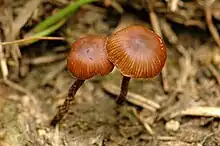Deconica
Deconica is a genus of mushroom-forming fungi in the family Strophariaceae. It was formerly considered synonymous with Psilocybe until molecular studies showed that genus to be polyphyletic, made of two major clades: one containing bluing, hallucinogenic species, the other non-bluing and non-hallucinogenic species. Deconica contains species formerly classified in the sections Deconica and Coprophila of Psilocybe.[2]
| Deconica | |
|---|---|
 | |
| Deconica montana | |
| Scientific classification | |
| Domain: | Eukaryota |
| Kingdom: | Fungi |
| Division: | Basidiomycota |
| Class: | Agaricomycetes |
| Order: | Agaricales |
| Family: | Strophariaceae |
| Genus: | Deconica (W.G.Sm.) P.Karst. (1879) |
| Synonyms[1] | |
Taxonomy
Until recently, Deconica was generally considered to be synonymous with Psilocybe, and was originally named as a subgenus of Agaricus by Worthington George Smith in 1870.[1] It was later raised to generic level by Petter Karsten in 1879.[3] However, several molecular studies published in the 2000s demonstrated that Psilocybe, as it was defined then, was polyphyletic.[4][5][6] The studies supported the idea of dividing the genus into two clades, one consisting of the bluing, hallucinogenic species, and the other made of the non-bluing, non-hallucinogenic species. However, the generally accepted lectotype (a specimen later selected when the original author of a taxon name did not designate a type) of the genus as a whole was Psilocybe montana, a non-hallucinogenic species; if those forms of the species in the study were to be segregated, it would leave the hallucinogenic clade without a valid name. To resolve this taxonomical dilemma, it was proposed in 2005 to conserve the name Psilocybe, with P. semilanceata as the type, leaving the option to use Deconica as the name for the non-hallucinogenic clade.[7] The proposal was accepted unanimously by the Nomenclature Committee for Fungi in 2009.[8] Recently, it has been reported that the non-bluing Psilocybe fuscofulva does not produce hallucinogenic compounds.[9] Thus, non-hallucinogenic species are also covered by the genus Psilocybe, not only Deconica.
Deconica had previously been recognized as a separate genus by several authors, including Rolf Singer in 1951,[10] Dennis and Orton in 1960,[11] and Horak in 1979.[12]
Species
Many species in Deconica were transferred there by mycologist Machiel Noordeloos in a 2009 publication.[13]
- Deconica aequatoriae[14]
- Deconica alpestris[14]
- Deconica angustispora[14]
- Deconica argentina[15]
- Deconica aureicystidiata[16]
- Deconica bayliasiana
- Deconica caricicola
- Deconica castanella
- Deconica chionophila
- Deconica citrispora
- Deconica coprophila
- Deconica crobula
- Deconica eucalyptina
- Deconica flocculosa
- Deconica goniospora[16]
- Deconica horizontalis
- Deconica hartii
- Deconica inquilina
- Deconica magica
- Deconica merdaria
- Deconica merdicola
- Deconica micropora
- Deconica moelleri
- Deconica mongolica[17]
- Deconica montana var. macrospora
- Deconica musacearum[15]
- Deconica novae-zelandiae
- Deconica neocaledonica[16]
- Deconica neorhombispora[18]
- Deconica pegleriana[15]
- Deconica philipsii
- Deconica phyllogena
- Deconica pratense
- Deconica pseudobullacea[14]
- Deconica rhomboidospora
- Deconica schoeneti
- Deconica semiinconspicua[14]
- Deconica singeriana[15]
- Deconica subcoprophila
- Deconica submaritima
- Deconica subviscida var. velata
- Deconica tenax
- Deconica thailandensis[14]
- Deconica umbrina[14]
- Deconica velifera
- Deconica venezuelana[15]
- Deconica vorax
- Deconica xeroderma
References
- "Deconica (W.G. Sm.) P. Karst. 1879". MycoBank. International Mycological Association. Retrieved 2010-11-23.
- Noordeloos M. "Deconica pages". www.entoloma.eu. Archived from the original on 2016-03-03.
- "Rysslands, Finlands och den Skandinaviska halföns Hattsvampar. Förra Delen: Skifsvampar". Bidrag till Kännedom of Finlands Natur Folk. 32 (26): 515.
- Moncalvo JM, Vilgalys R, Redhead SA, et al. (2002). "One hundred and seventeen clades of euagarics". Molecular Phylogenetics and Evolution. 23 (3): 357–400. doi:10.1016/S1055-7903(02)00027-1. PMID 12099793.
- Nugent KG, Saville BJ (2004). "Forensic analysis of hallucinogenic fungi: a DNA-based approach". Forensic Science International. 140 (2–3): 147–57. doi:10.1016/j.forsciint.2003.11.022. PMID 15036436.
- Matheny PB, Curtis JM, Hofstetter V, et al. (2006). "Major clades of Agaricales: a multilocus phylogenetic overview". Mycologia. 98 (6): 982–995. doi:10.3852/mycologia.98.6.982. PMID 17486974.
- Redhead SA, Moncalvo JM, Vilgalys R, Matheny PB, Guzmán-Dávalos L, Guzmán G (2005). "(1757) Proposal to conserve the name Psilocybe (Basidiomycota) with a conserved type" (PDF). Taxon. 56 (1): 255–257.
- Norvell L. (2009). "Report of the Nomenclature Committee for Fungi: 15" (PDF). Mycotaxon. 110: 487–92. doi:10.5248/110.487. Archived from the original (PDF) on 2012-03-31.
- Borovička J, Oborník M, Stříbrný J, Noordeloos ME, Parra-Sánchez LA, Gryndler M (2015). "Phylogenetic and chemical studies in the potential psychotropic species complex of Psilocybe atrobrunnea with taxonomic and nomenclatural notes". Persoonia. 34 (6): 1–9. doi:10.3767/003158515X685283. PMC 4510267. PMID 26240441.

- Lilloa 22: 504. 1951
- Dennis RW, Orton PD, Hora FB (1960). "New check list of British agarics and boleti. Parts I, II, III, and IV". Transactions of the British Mycological Society. 43 (2): 159–439, 440–59. doi:10.1016/s0007-1536(60)80067-8.
- Flora Criptog. Tierra del Fuego 11(6): 243. 1979
- Noordeloos M. (2009). "The genus Deconica (W. G. SM.) P. KARST. in Europe – new combinations" (PDF). Österreichische Zeitschrift für Pilzkunde. 18: 207–210. Archived from the original (PDF) on 2011-09-30. Retrieved 2011-09-01.
- Ramírez-Cruz, Virginia; Guzmán, Gastón; Guzmán-Dávalos, Laura (2012). "New combinations in the genus Deconica (Fungi, Basidiomycota, Agaricales)". Sydowia. 64: 217–219.
- da Silva PS. (2013). Os gêneros Deconica (W.G.Sm.) P.Karst.e Psilocybe (Fr.) P. Kumm. (Agaricales) na região Sul do Brasil : contribuíção á sua filogenia com bases morfológicas, moleculares e químicas (PDF) (Thesis). Universidade Federal do Rio Grande do Sul. Instituto de Biociências. Programa de Pós-Graduação em Botânica. Retrieved 29 November 2014.
- Ramírez-Cruz V, Guzmán G, Guzmán-Dávalos L (2013). "Type studies of Psilocybe sensu lato (Strophariaceae, Agaricales)". Sydowia. 65: 277–319.
- Ma T, Feng Y, Lin XF, Karunarathna SC, Ding WF, Hyde KD (2014). "Psilocybe chuxiongensis, a new bluing species from subtropical China". Phytotaxa. 156 (4): 211–20. CiteSeerX 10.1.1.641.4327. doi:10.11646/phytotaxa.156.4.3.
- Silva PS, Ramírez-Cruz V, Cortés-Pére A, Guzmán G, Guzmán-Dávalos L, Silveira RMB (2013). "Deconica neorhombispora (Agaricales, Strophariaceae): new combination and synonym". Sydowia. 65: 321–328.